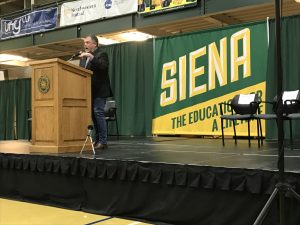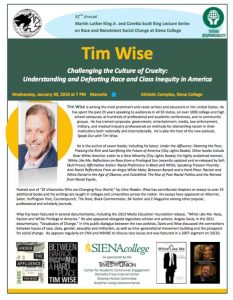This past Wednesday Jan. 30, 2019, author and activist Tim Wise delivered a lecture at Siena as the speaker of the 32nd Martin Luther King Jr. and Coretta Scott King Lecture Series on Race and Nonviolent Social Change. This year’s lecture was held in the MAC to accommodate the large audience. I’m terrible with numbers, but there were easily over 200 students, faculty, and people from the local community at the event.
Wise had a very commanding presence as a speaker, constantly keeping the attention on him and using his humor to connect with the audience. He commented at the beginning of his presentation that he has been delivering speeches nationwide for almost thirty years, and his impressive rhetorical abilities shone through. 
Wise spoke on how King’s memory has ultimately been sanitized and stripped of “revolutionary content” in America’s historical memory, explaining that people only remember the parts of King’s philosophy that make them comfortable. “See, everybody will tell you that they marched with Dr. King,” Wise said. “If everybody who says that they marched with Dr. King had actually marched with Dr. King, we wouldn’t be having to have this conversation about racism in 2019.”
The MLK keynote centered on the idea of a dangerous historical memory. Wise tied this notion to the 2016 election, immigration conflicts, and police brutality, honing in on the idea that past history is constantly repeating itself due to America’s faulty historical memory. “We keep trying to reinvent the wheel instead of understanding that we’re fighting the same dragons,” Wise explained, “the same monsters we’ve always been fighting.” He concluded his lecture optimistically and answered an hour of audience questions.
I will be covering Wise’s visit in the 2/15 issue of The Promethean, so if you’re interested in more extensive coverage of his time on campus and lecture, be sure to check it out.
